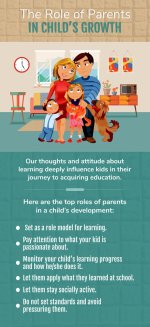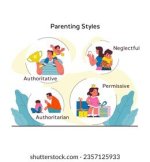Parental Psychology, encompassing attitudes, behaviour, and beliefs, significantly impacts a child's development and well-being. The way parents think, feel, and behave towards their children plays a powerful role in shaping a child's emotional, psychological, and social development. Whether consciously or unconsciously, parents influence how their children see themselves and the world around them.
*Children are highly sensitive to their parents' emotional states. Parents who are emotionally available, empathetic and calm tend to raise children who feel secure and valued. On the othere hand, if a parent frequently displays anxiety, anger or emotional unpredictability, it can lead to confusion or insecurity in the child. From this type of behavior Children may develop strong emotional intelligence. self-confidence and ability to handle stress. In other side , children may struggle with anxiety, self-esteem, emotional regulation which is more relatable to this generation. A parent's high expectations, desires directly shapes a child's behaviour and personality traits. For example, overly perfectionistic parenting may may create children who have to fear of failure or constantly seek approval. Conversely, supportive and accepting parents raise children who are more interdependent and self-assured.
* Children learn how to form relationships and survive in a society by observing their parents. Nurturing a home where emotions are expressed in healthy ways helps children develop empathy and strong social skills. In contrast, if children witness frequent conflict or coldness, they may find it difficult to build trust or communication in relationships.
* Parental expectations and involvement significantly impact a child's academic life.Encouragement, balanced expectations and involvement in learning foster motivation and resilience. However, excessive pressure or disinterest can lead to academic burnout or disengagement .Parental psychology can either protect a child from expose them to mental health challenges. Emotional warmth, security and open communication serve as protective factors. In contrast,chronic stress, neglect or emotional instability in parents can increase the child ‘s risk of depression, anxiety or behavioral issues,fear of attachments , introvertness and can misguide with their life.
*One of the most important principles in parenting psychology is understanding the children's needs, behaviour and perspective change with age -and so should the parents interact with them. A parenting approach that works well for a toddler may be ineffective or even harmful when used with a teenager.Adapting parenting styles, as children grow helps nurture healthy development and a stronger parent-child bond.
1. Early childhood (0-5 years)
In the earliest years, children need constant care; emotional warmth and physical closeness.Parents should focus on establishing trust, using gentle discipline and creating a safe environment.
2. Middle childhood (6-12 years)
During this phase, children become more independent and begin developing social skills and self-identity. They still need structure but also freedom to explore.Parent should supportive, communicative , praising their efforts and teach problem -solving skills.
3. Adolescence (13-18 years)
This is the most crucial stage of a human life. Teenagers seek independence and identity often challenging to parental authority. This is a critical time for open dialogue and mutual respect. Parents should respectful, understanding ,friendly to their children and their thoughts . The guidance should shift from control to guidance - allow them room for decision making while maintaining boundaries. Parents should allow them to share their emotions,likes, dislikes and thoughts to speak out.
4. Young Adulthood (18+ years)
As children transition to adulthood, the parental role becomes more of a mentor. Interactions should be rooted in mutual respect and autonomy. Parents should encouraging, respectful and trusting towards the child. They should offer support without overstepping, allow space for personal growth and responsibilities.
*Parenting and child development are deeply intertwined,with the parent-child relationship playing a crucial role in shaping a child’s socioemotional, cognitive,neurobiological and health outcomes.While children are shaped by their parents psychology,they also influence how parents grow and adapt. Adapting parenting behavior to a child's age isn't about changing your values-it’s about changing your approach . Children grow through stages of development that each demand different types of attention, discipline and communication. When parents become more mindful and flexible of how their mindset and emotions affect their children, they pave the way for a generation that is more emotionally aware , resilient and compassionate.
*Children are highly sensitive to their parents' emotional states. Parents who are emotionally available, empathetic and calm tend to raise children who feel secure and valued. On the othere hand, if a parent frequently displays anxiety, anger or emotional unpredictability, it can lead to confusion or insecurity in the child. From this type of behavior Children may develop strong emotional intelligence. self-confidence and ability to handle stress. In other side , children may struggle with anxiety, self-esteem, emotional regulation which is more relatable to this generation. A parent's high expectations, desires directly shapes a child's behaviour and personality traits. For example, overly perfectionistic parenting may may create children who have to fear of failure or constantly seek approval. Conversely, supportive and accepting parents raise children who are more interdependent and self-assured.
* Children learn how to form relationships and survive in a society by observing their parents. Nurturing a home where emotions are expressed in healthy ways helps children develop empathy and strong social skills. In contrast, if children witness frequent conflict or coldness, they may find it difficult to build trust or communication in relationships.
* Parental expectations and involvement significantly impact a child's academic life.Encouragement, balanced expectations and involvement in learning foster motivation and resilience. However, excessive pressure or disinterest can lead to academic burnout or disengagement .Parental psychology can either protect a child from expose them to mental health challenges. Emotional warmth, security and open communication serve as protective factors. In contrast,chronic stress, neglect or emotional instability in parents can increase the child ‘s risk of depression, anxiety or behavioral issues,fear of attachments , introvertness and can misguide with their life.
*One of the most important principles in parenting psychology is understanding the children's needs, behaviour and perspective change with age -and so should the parents interact with them. A parenting approach that works well for a toddler may be ineffective or even harmful when used with a teenager.Adapting parenting styles, as children grow helps nurture healthy development and a stronger parent-child bond.
1. Early childhood (0-5 years)
In the earliest years, children need constant care; emotional warmth and physical closeness.Parents should focus on establishing trust, using gentle discipline and creating a safe environment.
2. Middle childhood (6-12 years)
During this phase, children become more independent and begin developing social skills and self-identity. They still need structure but also freedom to explore.Parent should supportive, communicative , praising their efforts and teach problem -solving skills.
3. Adolescence (13-18 years)
This is the most crucial stage of a human life. Teenagers seek independence and identity often challenging to parental authority. This is a critical time for open dialogue and mutual respect. Parents should respectful, understanding ,friendly to their children and their thoughts . The guidance should shift from control to guidance - allow them room for decision making while maintaining boundaries. Parents should allow them to share their emotions,likes, dislikes and thoughts to speak out.
4. Young Adulthood (18+ years)
As children transition to adulthood, the parental role becomes more of a mentor. Interactions should be rooted in mutual respect and autonomy. Parents should encouraging, respectful and trusting towards the child. They should offer support without overstepping, allow space for personal growth and responsibilities.
*Parenting and child development are deeply intertwined,with the parent-child relationship playing a crucial role in shaping a child’s socioemotional, cognitive,neurobiological and health outcomes.While children are shaped by their parents psychology,they also influence how parents grow and adapt. Adapting parenting behavior to a child's age isn't about changing your values-it’s about changing your approach . Children grow through stages of development that each demand different types of attention, discipline and communication. When parents become more mindful and flexible of how their mindset and emotions affect their children, they pave the way for a generation that is more emotionally aware , resilient and compassionate.


